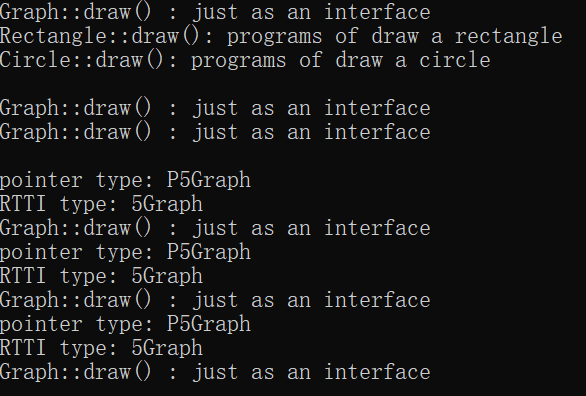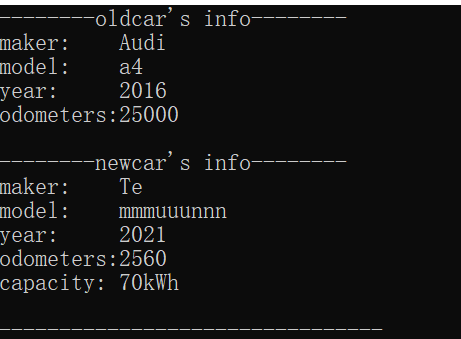实验4 继承
实验任务2
#include <iostream> #include <typeinfo> // definitation of Graph class Graph { public: void draw() { std::cout << "Graph::draw() : just as an interface\n"; } }; // definition of Rectangle, derived from Graph class Rectangle : public Graph { public: void draw() { std::cout << "Rectangle::draw(): programs of draw a rectangle\n"; } }; // definition of Circle, derived from Graph class Circle : public Graph { public: void draw() { std::cout << "Circle::draw(): programs of draw a circle\n"; } }; // definitaion of fun(): as a call interface void fun(Graph *ptr) { std::cout << "pointer type: " << typeid(ptr).name() << "\n"; std::cout << "RTTI type: " << typeid(*ptr).name() << "\n"; ptr -> draw(); } // test int main() { Graph g1; Rectangle r1; Circle c1; // call by object name g1.draw(); r1.draw(); c1.draw(); std::cout << "\n"; // call by object name, and using the scope resolution operator:: r1.Graph::draw(); c1.Graph::draw(); std::cout << "\n"; // call by pointer to Base class fun(&g1); fun(&r1); fun(&c1); }
运行结果:

添加virtual
#include <iostream> #include <typeinfo> // definitation of Graph class Graph { public: virtual void draw() { std::cout << "Graph::draw() : just as an interface\n"; } }; // definition of Rectangle, derived from Graph class Rectangle : public Graph { public: void draw() { std::cout << "Rectangle::draw(): programs of draw a rectangle\n"; } }; // definition of Circle, derived from Graph class Circle : public Graph { public: void draw() { std::cout << "Circle::draw(): programs of draw a circle\n"; } }; // definitaion of fun(): as a call interface void fun(Graph *ptr) { std::cout << "pointer type: " << typeid(ptr).name() << "\n"; std::cout << "RTTI type: " << typeid(*ptr).name() << "\n"; ptr -> draw(); } // test int main() { Graph g1; Rectangle r1; Circle c1; // call by object name g1.draw(); r1.draw(); c1.draw(); std::cout << "\n"; // call by object name, and using the scope resolution operator:: r1.Graph::draw(); c1.Graph::draw(); std::cout << "\n"; // call by pointer to Base class fun(&g1); fun(&r1); fun(&c1); }
运行结果:

归纳总结:
同名覆盖原则:派生类与基类中有相同成员时,若未强行指名,则通过派生类对象使用的是派生类的同名成员;
如果要通过派生类的对象访问基类被覆盖的同名成员,需要加 对象名.基类名::同名成员 来限定。
二元作用域分辨符:类名::成员名。
类型兼容原则:派生类对象可以隐含转换为基类对象,即用派生类对象中从基类继承来的成员,逐个赋值给基类对象的成员。
派生类的对象也可以初始化基类对象的引用。
派生类对象的地址也可以隐含转换为指向基类的指针。
实验任务3
battery.hpp
#ifndef BATTERY_HPP #define BATTERY_HPP #include<iostream> class Battery{ private: int capacity; public: Battery(int capacity0):capacity{capacity0}{} int get_capacity(){ return capacity; } }; #endif
car.hpp
#ifndef CAR_HPP #define CAR_HPP #include<iostream> #include<string> #include<iomanip> using namespace std; class Car{ private: string maker,model; int year,odometers; public: Car(string maker0,string model0,int year0,int odometers0=0):maker{maker0},model{model0},year{year0},odometers{odometers0}{} void info(){ cout<<left<<setw(10)<<"maker:"<<maker<<endl; cout<<left<<setw(10)<<"model:"<<model<<endl; cout<<left<<setw(10)<<"year:"<<year<<endl; cout<<left<<setw(10)<<"odometers:"<<odometers<<endl; } void update_odometers(int new_odometers); }; void Car::update_odometers(int new_odometers){ if(new_odometers<odometers){ std::cout<<"Error!"; } else odometers=new_odometers; } #endif
electricCar.hpp
#define ELECTRICCAR_HPP #include"car.hpp" #include"battery.hpp" #include<iostream> #include<iomanip> #include<string> using namespace std; class ElectricCar:public Car{ private: Battery battery; public: ElectricCar(string maker0,string model0,int year0,int capacity0=70,int odometers0=0):Car(maker0,model0,year0,odometers0),battery(capacity0){} void info(){ Car::info(); cout<<left<<setw(10)<<"capacity:"<<battery.get_capacity()<<"kWh"<<endl; } }; #endif
task3.cpp
#include<iostream> #include"electricCar.hpp" int main(){ using namespace std; //test class of Car Car oldcar("Audi","a4",2016); cout<<"--------oldcar's info--------"<<endl; oldcar.update_odometers(25000); oldcar.info(); cout<<endl; //test class of ElectricCar ElectricCar newcar("Tesla","model s",2016); newcar.update_odometers(2500); cout<<"--------newcar's info--------"<<endl; newcar.info(); }
运行结果:

实验任务4
pets.hpp
#ifndef PETS_HPP #define PETS_HPP #include<iostream> #include<string> using namespace std; class MachinePets{ private: string nickname; public: MachinePets(const string s):nickname{s}{} string get_nickname() const; virtual string talk(); }; string MachinePets::get_nickname()const{ return nickname; } string MachinePets::talk(){ } class PetCats:public MachinePets{ public: PetCats(const string s):MachinePets(s){} string talk(){ return "miao wu~"; } }; class PetDogs:public MachinePets{ public: PetDogs(const string s):MachinePets(s){} string talk(){ return "wang wang~"; } }; #endif
task4.cpp
#include<iostream> #include"Pets.hpp" void play(MachinePets *ptr){ std::cout<<ptr->get_nickname()<<" says "<<ptr->talk()<<std::endl; } int main(){ PetCats cat("miku"); PetDogs dog("da huang"); play(&cat); play(&dog); }
运行结果:




 浙公网安备 33010602011771号
浙公网安备 33010602011771号